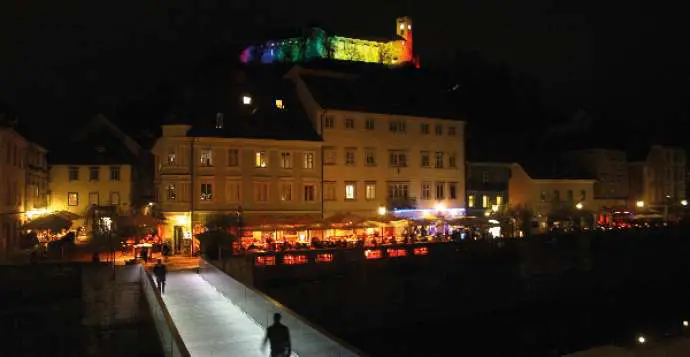STA, 25 September 2020 - The Ljubljana Pride Parade to be held on Saturday is marking two decades since the first protest rally against homophobia was staged in the capital. The LGBTIQ+ community has managed to secure a number of rights since, but its members still do not live as equals in Slovenian society and homophobic discourse is on the rise again.
The roots of the Ljubljana Pride Parade date back to 8 June 2001 when gay poets Brane Mozetič and Jean Paul Daoust were denied entry into the then Cafe Galerija bar in the centre of the city.
Not receiving an apology and formal condemnation, activists first responded to the incident with an initiative involving slow and protracted drinking of mineral water at the bar and then with a rally that was held on 6 July to evolve into the first official Pride Parade a year later.
These events and the path walked since were remembered at several events in June, including with a mineral water drinking debate at the scene of the original sin, an exhibition on 20 years of the Ljubljana Pride Parade, a literary evening and concert, a symposium on LGBTIQ+ rights and web panels on rights in healthcare, legislation, social protection and social inclusion.
The president of Ljubljana Pride Parade Society Simona Muršec has told the STA that members of the LGBTIQ+ community have empowered themselves in the past 20 years, but inequalities persist. Also, they reveal their sexual orientation more frequently, even in the countryside, but reactions have become stronger as well.
"Unfortunately the general mindset is deteriorating. We see, notice and feel an increase in hate speech. There is an increase in very extreme forms of rejecting even the right to LGBTIQ+ individuals existing, let alone to them revealing themselves publicly," Muršec said.
She meanwhile sees the changes that have happened within the community in the last 20 years as one of the main achievements. LGBTIQ+ representatives and activists are better organised today and organisations promote different groups. While the focus 20 years ago was mostly on the needs of gay people, trans and intersex persons are also represented today.
There is practically no local environment today that would not feature LGBTIQ+ members, Muršec said, adding "this is a major step, as 20 years ago a great majority of the countryside still lived in the conviction that such people are not among us or need to stay hidden".
As for key legal gains, Muršec highlighted the civil union act from 2016, which regulates same-sex partnership. "The struggle for this was long and is not finished yet, since a civil union is not yet equalised with marriage."
More and more people are deciding for formal status and LGBTIQ+ members are using legal means. "By getting new practices and legal procedures, it becomes easier to fight for equal treatment," Muršec added.
Equal treatment is one of the fields that the community still wants addressed, with Muršec noting that the attitudes of, say the Ljubljana and Maribor administrative units, to procedures initiated by same-sex couples may still differ.
Returning to people's attitudes in the street and other public institutions, Muršec said LGBTIQ+ persons in small towns still face discrimination, while the school is often a cruel environment as well.
One of the main legal fields highlighted as still discriminatory by LGBTIQ+ members is healthcare and access to health services. Muršec said many still do not get treated in a proper and dignified manner, while she also mentioned the fight for equal access to artificial insemination.
As for social security, she noted that the coronacrisis exacerbated the housing issue of many young LGBTIQ+ individuals, with student homes and meeting points closing. "The general mantra was: go home," said Muršec, while stressing the family is often the primary environment of rejection for LGBTIQ+ individuals.
The community meanwhile also sees the need to join forces with other social struggles. "We cannot pretend that, say, the attack on media freedom is not connected to us," she said, pointing to the example of Poland where LGBTIQ+ persons are being dehumanised and used ideologically in the media for scaremongering.






